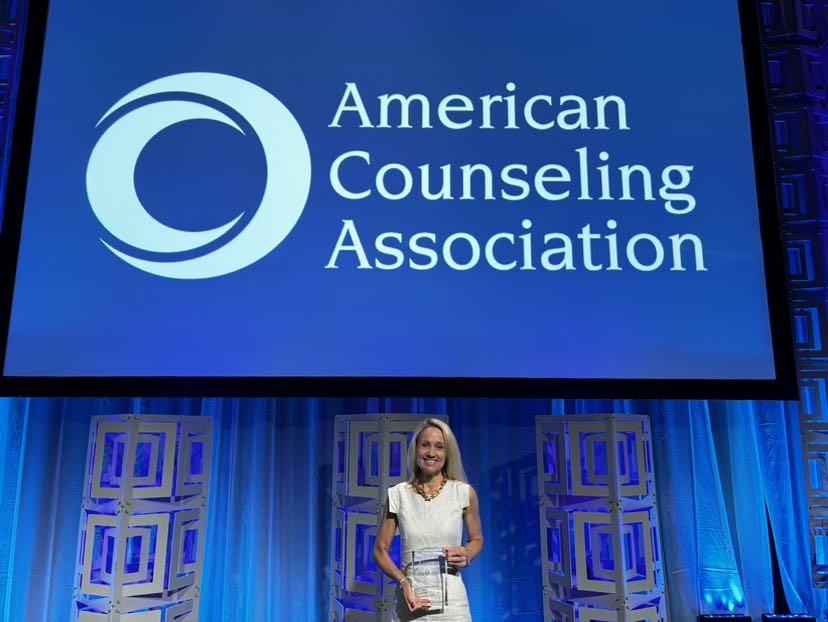Counseling Program Assistant Professor Stephanie Dailey is the Recipient of the American Counseling Association Foundation 2024 Kitty Cole Human Rights Award
May 6, 2024
Stephanie Dailey, assistant professor in the Counseling program within the School of Education at George Mason University, was recently honored as recipient of the 2024 Kitty Cole Human Rights Award in recognition of her remarkable contributions to casualty mitigation during school shootings, the development of safe school lockdown drills, and the introduction of innovative models to strengthen school and community mass violence response protocols. Dailey’s selection for this award reflects her dedication and commitment to human rights in her pursuit of equitable treatment and social justice, particularly within historically marginalized communities affected by acts of mass violence.

The Kitty Cole Human Rights Award is a distinguished national award sponsored by the American Counseling Association Foundation which is presented to counselors who exhibit exceptional dedication and leadership in furthering human rights causes. Named after Kitty Cole, a counselor and notable advocate for social justice, the award acknowledges individuals who have made significant strides in promoting equality, dignity, and justice for all. Within the counseling profession, this award celebrates individuals who have demonstrated outstanding commitment and achievement in advancing human rights, notably contributing to enhancing equity, justice, and inclusivity in counseling practice, education, and advocacy.
The conferral of the Kitty Cole Human Rights Award to Dailey is a testament to the dedication she has demonstrated throughout her career to disaster behavioral health and human rights. Her career has focused on the intersection of human rights and mental health, particularly in disaster response and recovery efforts. Dailey states, “I have emphasized equitable approaches to support historically marginalized communities affected by disasters, while advocating for procedural justice and impartial policies for communities of color. Advocating for marginalized communities’ rights has been a cornerstone of my career, addressing issues from trauma recovery to systemic inequalities and school safety.”
Dailey expressed her deep gratitude upon being selected as recipient of the award. “I am humbled and honored to be presented with this award in recognition of my advocacy for human rights within the counseling profession,” she commented. “I have worked to address systemic inequalities, promote inclusivity, and advocate for vulnerable communities’ rights, particularly those impacted by trauma, violence, and discrimination. Throughout my career, I have tried to emphasize the importance of recognizing and addressing human rights issues within the counseling profession to build a more inclusive, just, and mentally healthy society.”
Sharing her thoughts on the intersection of human rights with the counseling profession, Dailey observed, “Human rights are deeply ingrained in the counseling profession, reflected in its ethics and principles that prioritize respect for diversity, cultural competence, and social justice. Counselors actively advocate for their clients’ rights and dignity, providing culturally sensitive services and addressing systemic inequalities that impact mental health outcomes.”
Dailey added that in addressing issues such as access to mental health care and discrimination based on race, gender identity, sexual orientation, and socioeconomic status, counselors play a pivotal role in advancing human rights and promoting mental well-being for all. She emphasized, “Upholding principles of dignity, equality, and social justice, counselors strive to create a more just and equitable society where everyone can access the support needed to thrive.”
When asked about what human rights issues are now at the forefront in the counseling profession, Dailey cited access to mental health care and the need to dismantle systemic barriers to treatment as major challenges that counselors are grappling with. “Counselors are actively advocating for the rights of marginalized and oppressed groups while promoting mental health parity and equity in services,” Dailey stated. “Issues such as racial justice, LGBTQ+ rights, refugee and immigrant rights, and disability rights are central to counselors’ work in advancing human rights and social justice within their practice. In clinical and school counseling, counselors are addressing the pervasive impact of systemic racism and discrimination on mental health outcomes, and they recognize the necessity of trauma-informed approaches that acknowledge and address the intersecting vulnerabilities experienced by individuals facing multiple forms of oppression.”
Elaborating on the relationship between human rights and mental well-being, Dailey maintained that the connection is profound and reciprocal. “Upholding human rights, including access to fundamental needs such as safety, dignity, and freedom from discrimination, is crucial for fostering mental health and overall well-being,” she stated. “Conversely, violations of human rights, such as trauma, discrimination, and social injustice, can significantly impact mental health, leading to heightened risks of psychological distress, trauma-related symptoms, and other mental health challenges.”
Please join the College of Education and Human Development community in congratulating Stephanie Dailey for being named the recipient of the 2024 Kitty Cole Human Rights Award—a well-deserved honor that recognizes her dedication in promoting the importance of human rights in behavioral health and counseling. To learn more about George Mason’s Counseling program, please visit the program website.
